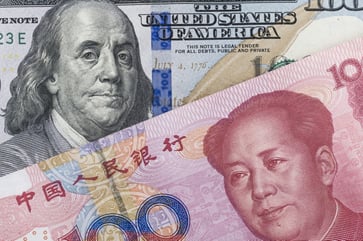 Look up the phrase “Chinese currency manipulation” on the web and you’ll get a flood of contentious articles that either point out how a devalued Chinese Yuan harms American businesses, or try to outright dismiss the importance and impact of currency manipulation by any foreign government.
Look up the phrase “Chinese currency manipulation” on the web and you’ll get a flood of contentious articles that either point out how a devalued Chinese Yuan harms American businesses, or try to outright dismiss the importance and impact of currency manipulation by any foreign government.
The truth is, when any foreign nation’s currency is devalued, it has a direct effect on that nation’s competitiveness in the global market. Just last August, China made another move to devalue its own currency, artificially lowering the costs of Chinese exports just a little bit more.
As noted in an article featured on The Guardian, “taking the long view, last week’s devaluation by China, which left the yuan about 3% weaker against the dollar, was relatively modest.” However, even relatively minor shifts in the value of a nation’s currency can have an adverse effect on the ability of other nations to compete fairly in the global market.
So, if the most recent devaluation was so “modest,” why is this such an important issue for U.S. manufacturers?
Well, because the devaluation of China’s currency can have a direct impact on the U.S. manufacturing industry in several ways, such as:
1: Increasing the Comparative Cost of U.S. Exports
One of the most fundamental ways that a devalued Chinese Yuan impacts American manufacturers is that it makes American exports more expensive than Chinese exports.
For example, say that before the most recent devaluation of the Yuan, the cost to manufacture a product in America and ship it to England was the same for an English company as it would be to manufacture the same product in China and ship it to the same place for the same company (it wasn’t, but let’s just say this for the sake of argument).
In this instance, the English company would import from whichever source could deliver superior quality faster, since pricing would be the same.
However, after the devaluation of the Yuan, the cost of doing business in China is now less than the cost of doing business with an American company, giving the advantage to the Chinese exporter. It’s possible that the American company could still win the bid, but it would be that much more difficult with the “increased” price of the American product compared to the Chinese product.
2: Loss of Manufacturing Jobs in the U.S.
 A healthy manufacturing economy adds strong middle-class jobs to the country. As the devaluation of the Yuan allows Chinese companies to further undercut American companies in production costs, U.S.-based manufacturers are forced to find ways to reduce expenses to stay operational.
A healthy manufacturing economy adds strong middle-class jobs to the country. As the devaluation of the Yuan allows Chinese companies to further undercut American companies in production costs, U.S.-based manufacturers are forced to find ways to reduce expenses to stay operational.
This is part of the reason why so many manufacturers outsourced their production from the U.S. to foreign countries such as China back in the 90s. The labor and total cost of doing business was less over there, so it was only natural to outsource production, and thus jobs, overseas.
However, even when businesses aren’t moving their production overseas, the devalued Chinese currency makes it harder to compete, grow market share, and add jobs.
3: It Makes It Harder to Import to China
What would you do if your business could add a billion people to its market share? Odds are, you’d bust out the champagne if your company suddenly gained access to a market representing a seventh or more of the planet’s population.
That’s what China represents, but the devalued Chinese Yuan makes it harder for American businesses to gain any traction in a Chinese market, regardless of any trade agreements our governments might reach.
Fred Bergstein, Senior Fellow and Professor Emeritus at the Peterson Institute for International Economics, explains the reason why a devalued Yuan makes it harder for American companies to gain access to the Chinese market in a Forbes.com article, saying that when countries engage in currency manipulation, they “subsidize their exports and raise the price of their imports, sometimes by as much as 30-40%.”
What would happen if the American dollar fell in value and the effective price of every Chinese-imported product jumped by 30-40%? Odds are you would see a lot less of the “Made in China” mark on products in the supermarket, and more of the “Made in America” label because American-made goods would suddenly be much more affordable by comparison.
Weak currency creates an innate barrier against imports, while making exports extra-competitive on the global stage.
This is why it is important for American manufacturers to be aware of currency manipulation when it happens, and for policymakers to not only create, but to find ways to enforce, stricter trade regulations and measures to prevent unfair trade practices that make it impossible for fair competition to take place on the global market.
Join Marlin Steel and the National Association of Manufacturers in fighting to strengthen the American manufacturing industry and keep the American manufacturing renaissance going!



.gif)


